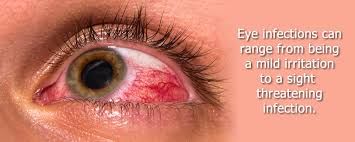Eye Infection - Know More About Its Myths And Facts!
Eye Infection
An eye infection can occur due to microorganisms which are harmful to eyes including fungi, bacteria, and viruses. An eye infection can appear in many ways. It depends on which part of your eye is infected. You may experience a problem in your eyelid, conjunctiva, and cornea. The clear front surface of your eye is cornea. Conjunctiva is the thin, moist area that covers the outer layer of the eye and inside of the eyelids. You may have an infection in one eye or both the eyes. The two known eye infections are conjunctivitis and stye. The problem of conjunctivitis is also known as pink eye. It is a highly contagious disease. Stye is a bump on the eyelid that looks similar to a pimple or a boil. The various common symptoms of eye infection are redness, swelling, itching, pain, discharge, watery eyes, dry eyes, or loss of vision. You should reach out to the best doctor as soon as you experience the symptoms of an eye infection. Sometimes, a delay and ineffective treatment can harm your eyesight. Your doctor will provide you with a treatment on the basis of the exact cause of your infection. He or she may prescribe you eye drops, compresses, antibiotics, or creams.
Symptoms
A person may experience a problem in one or both eyes. Check out various symptoms or signs of an eye infection:
- You may experience a pain or discomfort in your eye.
- There can be itching in your eyes due to an eye infection.
- You may have a burning sensation in your eyes.
- You may complain of watery or dry eyes.
- You may experience swelling around your eyes.
- Your eyes may become sensitive to the light as they may hurt when there is a bright lighting.
- You may get a small lump that is painful at the base of your eyelashes or under your eyelid.
- You may feel like there is something inside your eye even when there is nothing.
- You may have irritation in your eyes.
- There can be a discharge in your eye.
- Due to an eye infection, you may have blurred vision.
- The colour of your eye may turn red.
- You may experience pain when you touch your infected eye.
Causes
Check out various possible causes of eye infection:
- Conjunctivitis or pink eye is a highly contagious disease that can transmit easily from one person to another. Daycare workers and teachers are at great risk of conjunctivitis as they work closely with children. This problem generally spread in classrooms, daycare centres, and other similar environments.
- The other viral infections besides conjunctivitis including ocular herpes occur due to an exposure to the Herpes simplex virus.
- Fungal keratitis is a fungal infection of the eye and this infection is associated with Fusarium fungi found in organic matter. It can enter your eye in many different ways as in the form of an injury caused by the branch of a tree.
- Those who wear contact lenses are at a great risk of bacterial and fungal eye infections including Acanthamoeba keratitis. That is why a person should disinfect the contact lenses after removing them.
- Trachoma is an eye infection that is associated with Chlamydia trachomatis. Generally, the inner eyelid is infected due to trachoma. This infection can spread due to flies in an environment which is not clean.
How is it diagnosed?
Sometimes, an eye infection can be major and at other times it can be minor. There are some infections that get resolved on their own with some care. You should reach out to an ophthalmologist if your symptoms are bothering you for more than 48 hours. The ophthalmologist can easily recognise your problem by knowing about your medical history, having a look at the appearance of your eye and knowing if it is one eye or both. An eye doctor has many lighted devices that help to look at the retina and cornea. If you are experiencing the problem of discharge from the eye then your doctor may get it tested to know the organism. Gonorrhoea, herpes simplex, and chlamydia are some of the common diseases for which the test is done.
Prevention
Check out various tips that will help you to get prevention from an eye infection:
- If you are with a person who is suffering from conjunctivitis then you should avoid touching your eyes until you wash your hands properly. It will reduce your chance of catching an eye infection.
- You should use the anti-infective sprays and cleansers particularly in public areas such as classrooms and daycare centres.
- If there is some family member who has got an eye infection then you should keep his or her towel and bed clean. He or she should not share these items with others. Such people should wash their hands frequently.
- You should tell your children that they should not touch their eyes without washing their hands.
- If you wear contact lenses then you should disinfect your lenses after removing them. Contact lens wearers should wash their hands before touching the lens.
- You should never sleep with a contact lens in your eyes. Make sure that you remove your lenses before sleeping as it increases the risk of catching an eye infection.
Treatment
Viral conjunctivitis or pink eye generally gets resolve without taking any treatment within a few days. In most of the cases, parasitic and fungal eye infections are treated with the help of certain medicines. Check out various treatment options that are available for treating an eye infection:
1.Most of the common bacterial infections get resolve with a quick treatment including prescribed ointments, compresses, or antibiotic eye drops.
2.There are some common viral eye infections that resolve on their own. But if you have a severe viral eye infection then your doctor may prescribe you an antiviral eyedrop. In some cases of viral eye infections, steroid eye drops are used to reduce inflammation.
3.Your doctor may recommend you to have antiviral or antibiotics medicines as per the exact cause of your infection. These medicines are taken orally. If your symptoms get worse after taking some medicines then you should immediately reach out to the best ophthalmologist.
It is important that you follow good hygiene practices with the treatment so that you can be cured at the earliest. You should not touch your eyes without washing your hands if you met a person with conjunctivitis. You must wash your hands frequently. If you are a contact lens wearer then you should use lenses with clean hands. You should not wear contact lenses while sleeping as sometimes it can lead to an eye infection.
Complications
An infection in the eye can lead to many complications. Check out various complications associated with an eye infection:
- Sometimes, an eye infection can affect the lower and upper areas of eyelids leading to chalazion or stye.
- People may get serious eye infections that can affect the interior and deeper areas of the eyes. Such infection can lead to a sight-threatening condition including endophthalmitis.
- Inflammatory conditions including uveitis and dacryostenosis can occur when an infection invades the tear glands of the eye.
- There can be a blockage or inflammation in the tear drainage system of the eye due to an eye infection. This condition can lead to dacryocystitis.
- A corneal ulcer can occur due to an infection in the eye. Corneal ulcer looks similar to an abscess on the eye. This condition should not be left untreated otherwise it can lead to the problem of vision loss.
- Orbital cellulitis is an infection found around or in the soft tissue of the eyelids. It is an emergency situation as it can spread if not treated properly or left untreated.
Myths
Check out various myths about an eye infection:
Myth 1: Conjunctivitis is an eye infection that affects children only.
Fact: The problem of conjunctivitis or pink eye is generally linked with children. But it is a misconception that it can affect only children. As per research, elders are as equally as affected by conjunctivitis as children. It can occur due to parasites, bacteria, and viruses. It is not restricted to a particular age group. So, it is important that every person get protection from conjunctivitis as it is a highly contagious disease.
Myth 2: A single look can spread an eye infection.
Fact: It is a misconception or myth that an infection spreads by making an eye contact. By now, doctors are not able to discover that a disease can spread by just having an eye contact.
Conclusion
An eye infection can occur due to fungi, bacteria, and viruses. It can affect your eyelid, conjunctiva, and cornea. Red eyes, eye discharge, watery eyes, dry eyes, swollen eyes, blurry vision and light sensitivity are some of the common symptoms of an eye infection. You should reach out to the best doctor if your symptoms are bothering you. Sometimes, a delay in treatment can lead to major complication including vision loss. A person of any age can have an eye infection. You may have an infection in one eye or both the eyes.
Your doctor can easily recognise the problem by just having a look at the appearance of your eye. If you also have the problem of eye discharge then your doctor may ask you to get it checked to find out the organism. In some cases, tests are required such as gonorrhoea, herpes simplex, and chlamydia. Sometimes, an eye infection gets resolve on its own without any treatment. But in some cases, you should visit a doctor if you are experiencing symptoms for more than 48 hours. Your doctor may prescribe you ointments, compresses, antibiotic eye drops, antibiotic medications, or antiviral medications depending on your situation.
You should not touch your eyes until you wash your hands after meeting a person affected with an eye infection. You should wash your hands frequently in order to get prevention from an eye infection. Anti-infective sprays and cleansers should be used especially in public areas such as classrooms and daycare centres. Contact lens wearers should not touch lenses without washing their hands. They should wear lens when sleeping. They should disinfect the lenses after removing them.
Many complications are associated with an eye infection that is why you should get your eye checked regularly. An eye infection can affect the interior and deeper portion of eyes. An eye infection can lead to a corneal ulcer. It is important that one gets proper treatment for corneal ulcer otherwise it can to vision loss. Orbital cellulitis is another major complication that requires immediate treatment. People have many misconceptions about eye infection. Conjunctivitis is an eye infection that affects children only is one of the common myths. A single look can spread an eye infection is another myth.



+1.svg)
